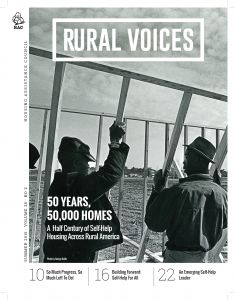50 Years, 50,000 Homes
Rory Doyle / There Is More Work To Be Done
Rory Doyle / There Is More Work To Be Done
 This story appears in the 2015 Summer Edition of Rural Voices
This story appears in the 2015 Summer Edition of Rural Voices
by Mike Shimon
The Marquette County Habitat for Humanity (MCHFH) affiliate, serving Marquette County, Michigan, was established in 1992 as a nonprofit organization with the core mission of eliminating substandard housing. MCHFH works with tenant families living in poor housing conditions and provides them an avenue to realize the dream of homeownership. The families must be low-income and willing to work sweat equity hours to help build their home.
During the first seven years, MCHFH provided homeownership to 16 families but there was a need to serve more families. In 2000, we started working with USDA Rural Development and NCALL Research, a regional Self-Help Technical Assistance (TA) provider. It took many months of work to apply for funding under the USDA Mutual Self-Help program. When it was done, though, we began serving many more families.
In general, self-help housing is a great system because the family partner groups gain marketable construction skills and have a real pride of ownership in the home that they helped construct.
Prior to collaborating with the USDA and NCALL, MCHFH worked with one family at a time and built one house at a time. Under the USDA model, partner family groups work together on each other’s homes until all homes in that group are complete. No family moves in until all homes in that group are complete. At that time, a group dedication ceremony is held and all families move into their homes at the same time.
In general, self-help housing is a great system because the family partner groups gain marketable construction skills and have a real pride of ownership in the home that they helped construct. Through required education programs, they also learn about budgeting, finance, insurance, and home maintenance.
MCHFH funds the construction and other expenses to build each home. The family receives a zero-interest mortgage equal to the total of these costs. MCHFH originates and services all mortgages. In addition, we require the families to make monthly escrow payments for taxes and insurance. Typically, a family will receive a 25- or 30-year, zero-interest mortgage based on the family’s ability to pay.
Loan payments go into a revolving fund referred to as “Funds for Humanity.” The proceeds from the revolving fund support approximately two houses per year. The net-profit from our Habitat ReStore,where we sell donated new and gently used furniture, home accessories, building materials, and appliances at a low-cost to the public, provides enough revenue to fund an additional house annually. We have several other funding sources that help us to build one or two additional homes. Funding is a big challenge for us and we are looking into using the USDA Section 502 program in the future.
Of the 94 homes built in Marquette County since 1993, 66 families are still living in their homes. Twenty-eight families moved out of their homes. The homeowners sold about 80 percent of these homes on their own. The remaining families deeded their home back to Habitat in lieu of foreclosure. These homes were either sold to a low-income family using a USDA Section 502 loan or sold on the open market.
Of the families recently served, 77 percent are very low-income, 7 percent are a racial or ethnic minority, and approximately 60 percent are female-headed households. Most of the families have steady employment income and all seem to be committed to improving their lives.
One of the challenges MCHFH faces with the group system is the size of our county. MCHFH is located in the city of Marquette, a community in the Upper Peninsula of Michigan. The service area for MCHFH is 3,425 square miles. It is the largest geographical county east of the Mississippi in the United States and has a population of over 60,000 residents. This rural county provides lots of challenges because of its size, the weather, and the fact that nearly all of our homes are built on scattered sites in multiple cities. This requires substantial time and travel needs for the families.
It was a relatively easy transition from serving one family at a time to adopting the self-help model that required all of the families to work together until all of the houses in a particular group were completed. The biggest challenge in our program is keeping the families motivated because we build on scattered sites and in different communities.
There are some very basic similarities between the Habitat for Humanity and the USDA Mutual Self-Help Housing programs. Family selection, the family commitment to partner with sweat equity, and their ability to pay a mortgage are critical factors to both organizations.
The Marquette County community has benefitted significantly since we have partnered with USDA. Since our inception in 1993, we have built 94 homes. During the past 15 years, 78 of those homes have been USDA-backed self-help houses. This has made a major impact on improving the low-income homeownership opportunities.
Mike Shimon is the Executive Director of Marquette County Habitat for Humanity in Marquette, Michigan. Marquette County Habitat for Humanity is a nonprofit, ecumenical Christian housing ministry seeking to eliminate poverty housing, and to make decent shelter a matter of conscience and action.